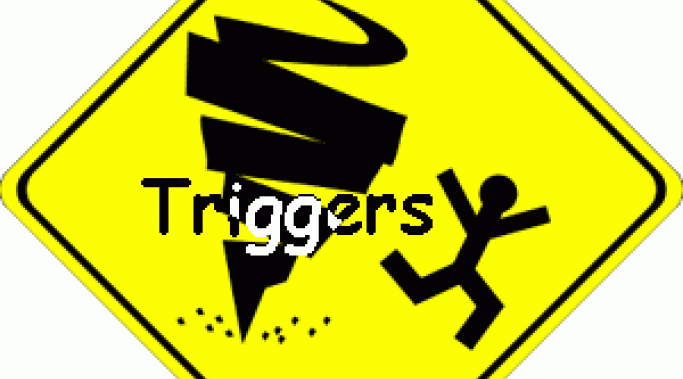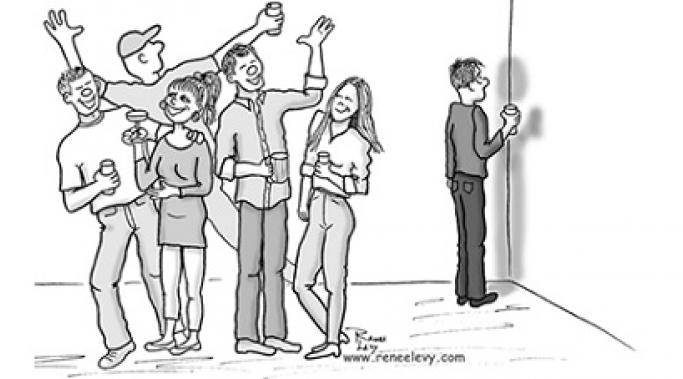A diagnosis of generalized anxiety disorder (GAD) or having panic attacks doesn’t automatically mean there will be a co-occurring diagnosis of depression. However, many people with an anxiety diagnosis do suffer from clinical depression, even if only from time-to-time. In my case, I have both bipolar and anxiety disorders. Like many others, I have found that serious anxiety can lead to depression.
Anxiety Symptoms – Anxiety Schmanxiety
I hear an anxious voice in my head. The voice I hear is not related to psychosis, but speaks to me loudly and clearly nevertheless. The anxious voice in my head belongs to anxiety, and its running commentary on what I'm doing wrong never seems to shut up.
As one of the resident anxiety bloggers here at HealthyPlace, I spend a fair bit of time thinking about anxiety disorders. Between living with anxiety, talking to others who live with anxiety, writing about anxiety, and reading about anxiety, I have amassed quite a bit of knowledge. This is good, because I get a lot of questions.
Among them: What is an anxiety trigger? What causes triggers? How can anxiety triggers be avoided? Unfortunately, there is no real, concrete “answer” to any of those questions, save for the first one. We can define what an anxiety trigger is.
Mental Illness Awareness Week 2014 continues. The week means slightly different things to different people (as in specific awareness, the attitude behind the desire for awareness, etc.) To me, it means something relatively simple. It means looking at people in a new way, leading to a new understanding of them as human beings. Mental illness happens to be part, just part, of who they/we are. Awareness of the whole package brings understanding of the whole person.
Assertiveness doesn't come easily to many people, myself included. Sometimes, the mere thought of having to express myself or make some need or another known is enough to kick anxiety into high gear. When engaged in a situation where it’s necessary to assert yourself—from speaking up to a supervisor about something you think isn’t quite right to informing a friend that you hate the restaurant she chooses every time you have lunch together, and a million other situations—anxiety can stop you in your tracks. Indeed, it’s difficult to be assertive when we’re nauseous, dizzy, sweaty, and unable to breathe properly let alone think clearly or concentrate. Happily, we’re not doomed to a life of passivity.
Most everyone engages in conversation daily. From talking to the members of our household, to answering the phone, to ordering our coffees in the morning – talking to those around us occurs often.
One doesn't need to have an anxiety disorder to know that certain conversations provoke a sense of discomfort or even dread. Arguing with a loved one, consoling someone at a funeral, or even telling someone “no” can cause anyone anxiety.
This, of course, makes us wonder: if it is reasonable that certain conversations or subjects cause most people anxiety, what does it do to a person with an anxiety disorder?
Humpty Dumpty sat on a wall. Humpty Dumpty . . . whoa, did you see that squirrel run across that wall, well, I guess it’s a fence, chasing . . . eggs . . . I need to go to the grocery store because we have no food because I keep forgetting to go and I’m tired of fast food . . . that squirrel was fast and he’s gone . . . I love fall . . . I keep forgetting to schedule my daughter’s senior pictures.
Wait. What was I doing? Oh yeah, reading this nursery rhyme.
Ugh! How am I going to be able to hold down a job if I can’t even read a stupid nursery rhyme? I guess I wouldn't have to remember going to the store then because I wouldn’t have any money. I’m so useless. How am I supposed to concentrate when there’s so much pressure in my head? Make it stop! What is wrong with me?
Like many people, I have been diagnosed with more than just anxiety. While it is possible to be diagnosed with just an anxiety disorder, I was not fortunate enough to be one of those people. As I have discussed before in this blog, I have co-occurring bipolar and anxiety disorders.
As readers of my blog will know, each of these disorders is awful in its own way. Occasionally, I’m asked which one I hate more. Sometimes, I wonder this, myself.
If you've ever had a panic attack, you know what it’s like. You’re just going about your life, perhaps in class or a meeting or a store or somewhere else, even home, when bam! Out of the blue, your heart begins to pound and your head begins to swim. The world around you blurs. Your hands shake and sweat. You can’t breathe, and your chest constricts painfully. The ground wobbles, making it all the more difficult for your weak legs to keep you steady. You’re nauseated and oh god you don’t want to get sick. And as if symptoms like these (they can vary a bit from person to person) aren't horrible enough, on top of all this you begin to doubt and question yourself.
To have generalized anxiety disorder (GAD) is to worry -- a lot. While true, this is an oversimplification. “Worry” doesn't really begin to describe what happens in GAD. Everyone worries; it’s part of being human. It’s a given that people will worry about their grade on a test, for example, worry about their job security when downsizing is taking place, or worry about their child’s safety when he or she is away. But with GAD, the worry becomes too much -- all-consuming, really, and typically isn't limited to a single situation. Rather than having worries in one’s life, for someone with GAD, life itself is a constant worry.








